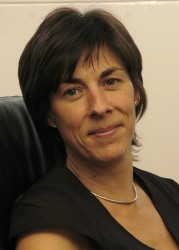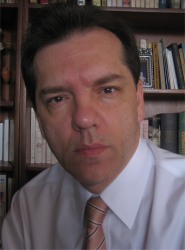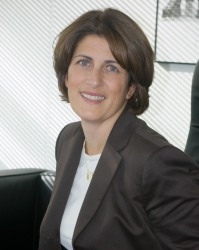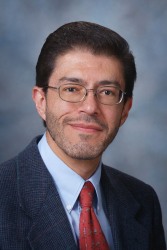Tessa Holyoake

Professor Tessa Holyoake
- 1980-85 Medicine Glasgow University
- 1985-86 House jobs Stobhill and Victoria, Glasgow
- 1986-89 General medical training Inverclyde Hospital, Greenock
- 1989-92 Haematology, Western Infirmary, Glasgow
- 1992-96 PhD, Beatson Institute for Cancer Research, Glasgow
- Specialist Haematology Training, Glasgow Royal Infirmary
- 1996-98 LRF Senior Lecturer, Terry Fox Labs, Vancouver
- 1999-2001 Senior Lecturer, Academic Transfusion Medicine Unit, Glasgow Royal Infirmary
- 2001-2004 Reader, Section of Experimental Haematology, Glasgow Royal
- 2004-present Professor, Section of Experimental Haematology, Glasgow Royal
- 2008 Relocation of Section of Experimental Haematology to the Paul O'Gorman Leukaemia Research Centre and West of Scotland Cancer Centre, Gartnavel Hospital
Research Interests
My research focuses on the cancer stem cell. Cancer stem cells sustain cancers and leukaemias, are inherently resistant to many cancer therapies, including novel targeted agents and ultimately cause relapse in patients following therapy. We are most interested in the blood cancers, in particular chronic myeloid leukaemia. We have developed laboratory methods to purify the cells of interest from leukaemia patients and from normal donors, allowing side by side comparisons of leukaemic versus normal stem cells. These comparisons include global analyses of gene expression and protein expression. Any differences can then be fully investigated and exploited through drug discovery. Recently we have begun to explore high throughput drug screening against the purified cancer stem cells hoping to find drugs that rapidly kill the cancer stem cells but leave normal stem cells intact.
On the clinical side I run clinical trials of novel agents for patients with CML Scotland wide.
Pat Garcia-Gonzalez
Pat Garcia-Gonzalez
Executive Director, The Max Foundation
Pat Garcia-Gonzalez, Executive Director of The Max Foundation, has been dedicated to improving the lives of blood cancer survivors around the world for over twelve years. A native of Argentina, Pat has a Master degree from the University of Washington and technical degree in nursing.
Pat is co-founder of The Max Foundation, an international NGO based in Edmonds, Washington, started in 1997 to connect families facing leukemia with resources for treatment access.
Under Pat's direction since 2005, The Max Foundation provides services to over 15,000 CML patients in more than 90 countries annually and has successfully started and supported local patient organizations in 12 countries.
In 2008, Pat was awarded the distinguished honor of the Golden Tennis Shoe Award from United States Senator, Patty Murray for her service and dedication to her community. She is a member of the Global Health Council and of the CML Advocates Network.
Brian J. Druker, MD
Dr. Druker is director of the OHSU Knight Cancer Institute, JELD-WEN Chair of Leukemia Research at Oregon Health & Science University, and investigator of the Howard Hughes Medical Institute. Upon graduating from the University of California, San Diego School of Medicine in 1981, Dr. Druker completed his internship and residency in internal medicine at Barnes Hospital, Washington School of Medicine in St. Louis, Missouri. He then trained in oncology at Harvard's Dana-Farber Cancer Institute.
Dr. Druker then returned to the lab to begin his research career studying the regulation of the growth of cancer cells and the practical application to cancer therapies. He developed 4G10, an anti-phosphotyrosine antibody that was an essential reagent to scientists at Novartis in their kinase inhibitor drug discovery program. In collaboration with Novartis, his laboratory performed pre-clinical studies that were instrumental to the development of Gleevec (imatinib), a drug that targets the molecular defect in chronic myeloid leukemia (CML). After completing a series of preclinical studies, Dr. Druker spearheaded the highly successful clinical trials of imatinib for CML. Imatinib is currently FDA approved for CML, gastrointestinal stromal tumors (GIST) and five other cancers.
His role in the development of imatinib and its application in the clinic have resulted in numerous awards for Dr. Druker, including the AACR-Richard and Hinda Rosenthal Award, the Warren Alpert Prize from Harvard Medical School, the American Society of Hematology's Dameshek Prize, the Lance Armstrong Foundation's Pioneer of Survivorship Carpe Diem Award, the American Cancer Society's Medal of Honor, the Kettering Prize from General Motors Cancer Research Foundation, the David A. Karnofsky Award from the American Society of Clinical Oncology, the Robert-Koch Award, and the 2009 Lasker-DeBakey Award for Clinical Medical Research. He was elected to the Institute of Medicine of the National Academies in 2003, the American Association of Physicians in 2006, and the National Academy of Sciences in 2007.
Jorge Cortes, MD
Professor of Medicine
Chief, CML Section
Department of Leukemia
The University of Texas MD Anderson Cancer Center
Houston, Texas
Jorge Cortes, MD, is deputy chair and professor of medicine in the Department of Leukemia at The University of Texas MD Anderson Cancer Center, Houston Texas where he directs the CML Program. Dr. Cortes received his medical degree in 1986 from the Universidad Nacional Autonoma de Mexico, Mexico City, and has been at MD Anderson Cancer Center since 1991. Dr. Cortes, whose clinical interest focus on new drug development and the management of patients with myelodysplastic syndromes, acute and chronic leukemias, and myeloproliferative disorders has authored over 400 peer-reviewed medical publications. He has received numerous awards including the Faculty Scholar Award from MD Anderson Cancer Center in 2003, the Annual Celgene Young Investigator Achievement Award for Clinical Research in Hematology in 2005, The Dr. John J. Kenny Award from The Leukemia & Lymphoma Society in 2006, the Service to Mankind Award from The Leukemia & Lymphoma Society in 2007, and the Otis W. and Pearl L. Walters Faculty Achievement Award in Clinical Research from MD Anderson Cancer Center in 2007. Dr. Cortes is chief editor of Current Hematological Malignancies Reports and Clinical Leukemia and serves in the Editorial Board of the Journal of Clinical Oncology, Leukemia, Clinical Cancer Research, Leukemia and Lymphoma and the American Journal of Hematology.
Francisco Cervantes
Francisco Cervantes is senior consultant at the Hematology Department of the Hospital Clínic, in Barcelona, Spain, and associate professor at the University of Barcelona. His main scientific interest is the study of chronic myeloid leukemia (CML) and the Ph-negative chronic myeloproliferative neoplasms (MPNs), mainly their natural history, prognosis, biology, and treatment. As a result of the activity in this field, he has published more than 190 articles in peer-review international journals, including the New England Journal of Medicine, Blood, Journal of Clinical Oncology, Leukemia, British Journal of Haematology, Experimental Hematology, Haematologica, Cancer, Oncogene, Seminars in Oncology, and the European Journal of Haematology. In the CML field,Dr. Cervantes contributed to the elaboration of Sokal’s score, is a coauthor of the publications of the IRIS study, which established imatinib as first-line treatment for CML, has participated in the introduction of the second-generation tyrosine kinase inhibitors for patients resistant to imatinib, as well as in the authorship of the European LeukemiaNet recommendations for the treatment of CML. His more recent contributions in the field of the MPNs have been the elaboration of the new prognostic classification of primary myelofibrosis on behalf of the International Working Group for Myelofibrosis Research and Treatment, as well as several studies on the role of leukocyte and platelet activation in the thrombosis of MPN patients. At local level, he is the national coordinator of the CML studies within the collaborative PETHEMA Spanish group. Dr Cervantes is a member of the American Society of Hematology, the European Hematology Association, the International Working Group for Myeloproliferative Neoplasms Research and Treatment, the European Leukemianet, and the Spanish Society of Hematology.
Jose Luis Lopez
 José Luis Lopez, MD
José Luis Lopez, MD
Caracas, Venezuela
Dr. Lopez is a Professor of Hematology and Internal Medicine at the "Universidad Central de Venezuela". Head of the Department of Hematology Clinics at the Banco Municipal de Sangre in Caracas, starting his work in this Institution in Hemato-Oncology Clinic at 1991 and developed the Molecular Dx Laboratory in 1992.
He occupied the Secretary position (2001-2003) at Venezuelan Society of Hematology and was a Founder Member of the National Transplant Organization of Venezuela.
Dr Lopez is an active member in the Investigation Department of his Medical Center and have been interested in Clinical Research and Molecular Genetic of Chronic Leukemias, collaborating like an Investigator Overseas in NCI-Cancer Therapy Evaluation Program (1995-1997).













